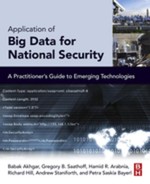Preface by Edwin Meese III
What is often called the “information age,” which has come to dominate the twenty-first century, is having at least as great an impact on current society as did the “industrial age” in its time, more than a century ago. The benefits and constructive uses of Big Data—a big product of the information age—are matched by the dangers and potential opportunities for misuse which this growing subject portends. This book addresses an important aspect of the topic as it examines the notion of Big Data in the context of national security.
Modern threats to the major nations of the world, both in their homelands and to their vital interests around the globe, have increased the national security requirements of virtually every country. Terrorism, cyber-attacks, homegrown violent extremism, drug trafficking, and organized crime present an imminent danger to public safety and homeland defense. In these critical areas, the emergence of new resources in the form of information technology can provide a welcome addition to the capabilities of those government and private institutes involved in public protection.
The impressive collection of authors provides a careful assessment of how the expanding universe of information constitutes both a potential threat and potential protection for the safety and security of individuals and institutions, particularly in the industrialized world.
Because of the broad application of this topic, this book provides valuable knowledge and thought-provoking ideas for a wide variety of readers, whether they are decision-makers and direct participants in the field of Big Data or concerned citizens who are affected in their own lives and businesses by how well this resource is utilized by those in government, academia, and the private sector.
The book begins with an introduction into the concept and key applications of Big Data. This overview provides an introduction to the subject that establishes a common understanding of the Big Data field, with its particular complexities and challenges. It sets forth the capabilities of this valuable resource for national security purposes, as well as the policy implications of its use. A critical aspect of its beneficial potential is the necessary interface between government and the private sector, based on a common understanding of the subject.
One of the book’s strengths is its emphasis on the practical application of Big Data as a resource for public safety. Chapters are devoted to detailed examples of its utilization in a wide range of contexts, such as cyberterrorism, violent extremist threats, active shooters, and possible integration into the battlefield. Contemporary challenges faced by government agencies and law enforcement organizations are described, with explanations of how Big Data resources can be adapted to effect their solutions. For this resource to fulfill its maximum potential, policies, guidelines, and best practices must be developed for use at national and local levels, which can continuously be revised as the data world changes.
To complement its policy and operational knowledge, the book also provides the technological underpinning of Big Data solutions. It features discussions of the important tools and techniques to handle Big Data, as well as commentary on the organizational, architectural, and resource issues that must be considered when developing data-oriented solutions. This material helps the user of Big Data to have a basic appreciation of the information system as well as the hazards and limitations of the programs involved.
To complete its comprehensive view of Big Data in its uses to support national security in its broader sense—including the protection of the public at all levels of government and private activity—the book examines an essential consideration: the public response and the political environment in which difficult decisions must be made. The ability to utilize the advantages of Big Data for the purposes of national security involves important legal, social, and psychological considerations. The book explains in detail the dilemmas and challenges confronting the use of Big Data by leaders of government agencies, law enforcement organizations, and private sector entities. Decisions in this field require an understanding of the context of national and international legal frameworks as well as the nature of the public opinion climate and the various media and political forces that can influence it.
The continuing advances in information technology make Big Data a valuable asset in the ability of government and the private sector to carry out their increasing responsibilities to ensure effective national security. But to be usable and fulfill its potential as a valuable asset, this resource must be managed with great care in both its technical and its public acceptance aspects. This unique book provides the knowledge and processes to accomplish that task.
Edwin Meese III is the 75th Attorney General of the United States (1985–1988).
..................Content has been hidden....................
You can't read the all page of ebook, please click here login for view all page.
